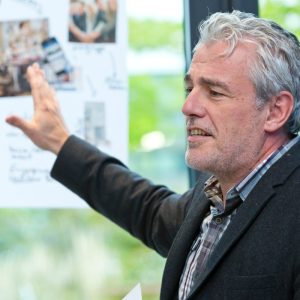Gaining insights from a global audience allows Jisc to enlighten our membership on international trends and activities, which can be invaluable for UK members when planning for success.
John Sumpter spoke about digital leadership and preparing institutions for a bright future from a UK perspective at a recent EdMedia Conference in New York in June 2022. The conference included renowned keynote speakers Creativity Strategist Dr Natalie Nixon and Best Selling Author Warren Berger.
Engaging Leadership and Gaining Academic Support
The conference gave a wonderful opportunity to gain compelling insight from a worldwide audience at one of the largest and longest-running events in the EdTech industry. As well as capturing some intriguing views on digital transformation, John used the opportunity to podcast some of his conversations with other digital leaders and educators, which captured a glimpse into the perspectives and practical activities of digital leaders from around the world. At the foot of this page, you can listen to a few “top tips” for engaging leadership, and gaining academic support when introducing technology into the curriculum.

Hybrid workplace
During the conference, a theme that emerged was the post-pandemic move towards hybrid working. This proved to be a topic which resonated across the conference and highlighted the need for institutions to review their human resources policies and staff contracts, to allow for and enable the hiring and retaining of staff who wish to work on and off campus in a hybrid model. Furthermore, Natalie Nixon (keynote speaker) talked about how now and in the future, Augmented Reality (AR) and Artificial Intelligence (AI) will start to replace humans in more basic and mundane roles, but companies that provide the best human experience at work will attract and retain the best and most talented staff. Dr Nixon also argues that ‘gut feeling’ will never be replaced by technology, and is a key aspect of success.
Companies that provide the best human experience at work will attract and retain the best and most talented staff
Natalie Nixon describes herself as a thought leader who has ‘optimised her loopy background in anthropology, fashion, design thinking, academia & dance!’ Dr Nixon spoke about her work to encourage creativity in the hybrid workplace and how she offers transformational advice to leaders by leveraging wonder and rigour to increase their commercial value. Natalie described how the question she gets asked frequently is ‘What is the business we should be in, as opposed to the business we’ve been churning in’. This question resonates with our own findings and the work we do with members around strategic planning. However, the question is slightly different but poses the same conundrum. We help strategic leaders ask the question ‘where are you now, and where do you want to be in the future?’ We often find this has not been considered enough before developing a strategy. You can learn more about this work here.
Where are you now, and where do you want to be
in the future
Dr Nixon concluded by adding that she helps people view through the prism of creativity and foresight, and talked about how creativity is the primary driver of innovation, moving between wonder and rigour to solve problems. It also gives purpose and meaning. You can find more about Natalie at Figure8thinking.
The effectiveness of basic inquiry
Much of the conference looked at learning and teaching and how strategy can help institutions to flourish. The questionologist, Warren Berger, encouraged us to consider questioning as a powerful tool in education at all levels, including working as or with senior leaders. Mr Berger painted a powerful picture of how many institutions and top-flight executives have forgotten the benefits of asking some of the most simple questions. Why? What if? How? These simple yet powerful questions are tools for leaders, and tools that Warren says are not used enough. ‘Questioning is the starting point of innovation,’ says Warren, and he denounces the idea of ‘mission statements’ as something that people can buy into and follow. Indeed, Warren says institutions should use ‘mission questions.’
Questioning is the starting point of innovation
These questions encourage a greater level of buy-in and encourage faculty and staff to think beyond what a statement “tells” them to do. Warren believes that the question requires people to consider for themselves the consequences of their actions or inactions.
You can find more about Warren and his work here.
Podcasts
In these two podcasts, we’re joined by Thilo Harth, Professor at Munster University of Applied Sciences in Germany, and Dr. Jana Gerard, Coordinator, EDvolution Center at Southeast Missouri State University, USA.
In both episodes, we discuss how they engage with leadership and gain academic support in digital transformation.


You can listen to the podcasts by clicking on each thumbnail
You can find more about the EdMedia conference here.

